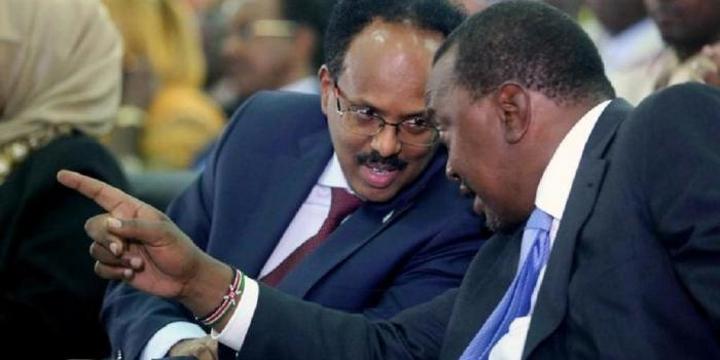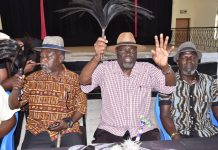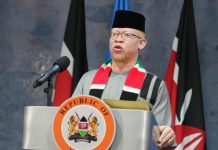Africa-Press – Kenya. The ruling delivered by the International Court of Justice (ICJ) on the maritime dispute between Kenya and Somalia has become a subject of debate.
ICJ judge Justice Joan Donoghue, on Tuesday, October 12, ruled that Kenya should give part of the disputed territory to Somalia.
The order was welcomed by the President of Somalia, Mohamed Farmaajo, who urged Kenya to follow suit and respect the ruling.
However, President Uhuru Kenyatta rejected the court’s verdict, pointing out that the International Court sought to oppose the sovereignty of the African countries.
Experts who spoke to Kenyans.co.ke, analysed the gravity of the situation and the available options for both countries to maintain cordial bilateral ties.
Political analyst Dr. Barrack Muluka affirmed that Kenyatta made the right call in rejecting the ruling as the President’s mandate. He reiterated that a country can choose to either agree or reject the verdict of the Court.
“The President of this country has got a responsibility to protect the national territory and its sovereignty.”
” The ICJ is not a top court as such, it’s a court, we recognise as a country, whose decisions can be rejected as in the present case,” Muluka stated.
He compared the rift between Kenya and Somalia to the 930 BC during King Solomon’s reign when he ruled between two women who claimed to be the mother of a baby.
“The fact that Farmaajo has accepted and Uhuru has rejected, it reminds me of the Solomon times when a baby was brought forth by two women who sought to have custody of the baby,” he pointed out.
His sentiments were echoed by Nafula Kisiangani, a political analyst and development practitioner who noted that the ruling came at an unfortunate time when the tension between the countries could escalate.
“I found the ICJ ruling quite insensitive. Uhuru has to defend the sovereignty of the country. If we appear vulnerable, we don’t know what will happen next.”
“Remember there was a time a Ugandan President claimed that his country’s territory extended to Nakuru county. So, Uhuru has to come out strongly,” she stated.
Ms Kisiangani noted that African countries ought to find peace resolution mechanisms within the continental unions and organisations instead of relying on international courts to determine their issues.
Former Law Society of Kenya Chief Executive Officer Apollo Mboya, however, faulted how Kenya handled the case, noting that Nairobi downplayed the gravity of the situation.
“Coming to the actual case, I believe Kenya bungled it, we were not prepared. We challenged the jurisidiction, changed lawyers, urging that we should be given more time, yet we did not take any steps to solve the steps during the negotiation process,” Mboya pointed out.
He noted that the country should have used African Union’s Commission on boundaries mechanism before the case was taken to the ICJ. He noted that the option is still viable.
Mboya further intimated that Kenya may take certain steps as leverage if the two Presidents were to begin a negotiation process
“Kenya can negotiate with the President of Jubaland, Mohamed Madobe, and recognise it as a sovereign state since it always wants to secede from Somalia.
“Then we can close Kakuma and Dadaab camps and send the refugees back to Somalia. However, Uhuru should not withdraw Kenyan troops from the troubled region as a war would ensue,” he stated.






